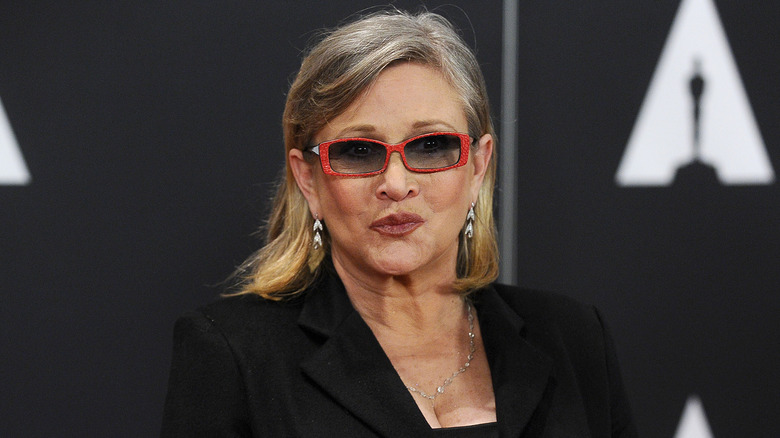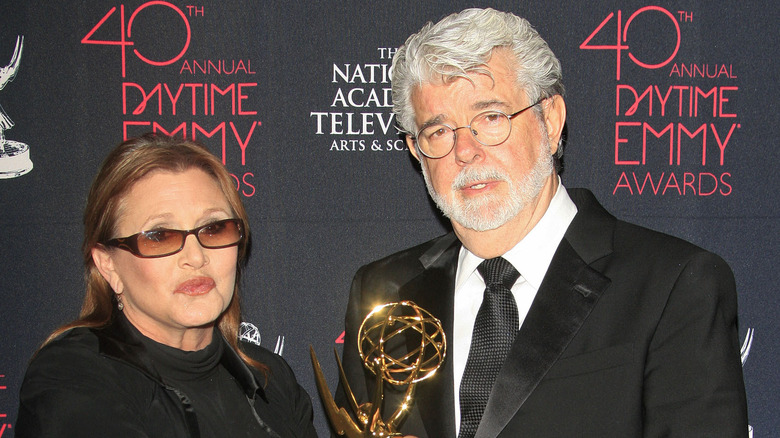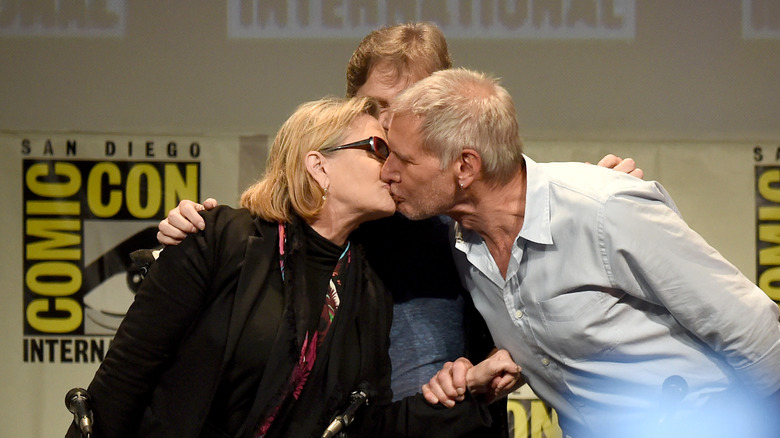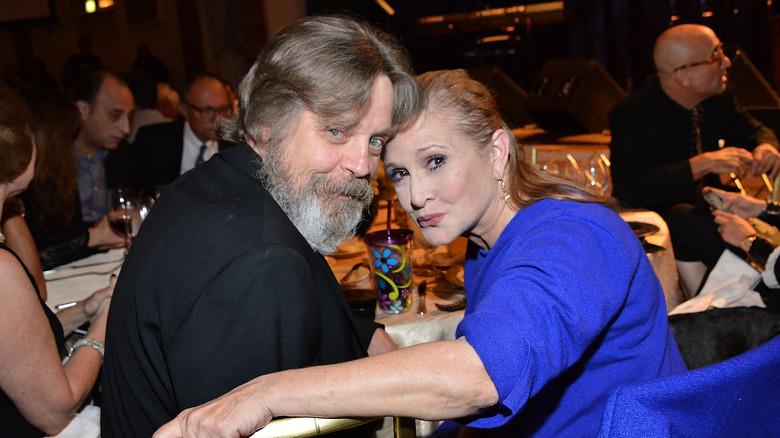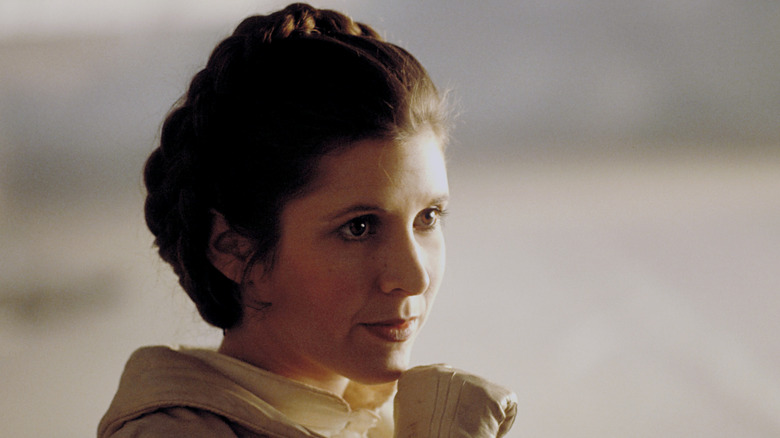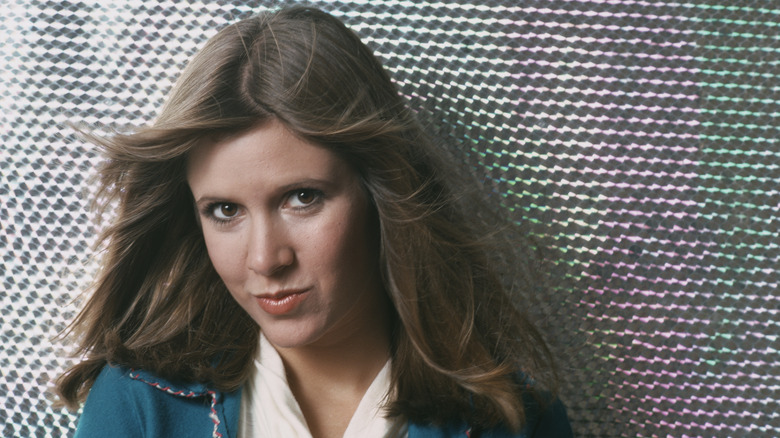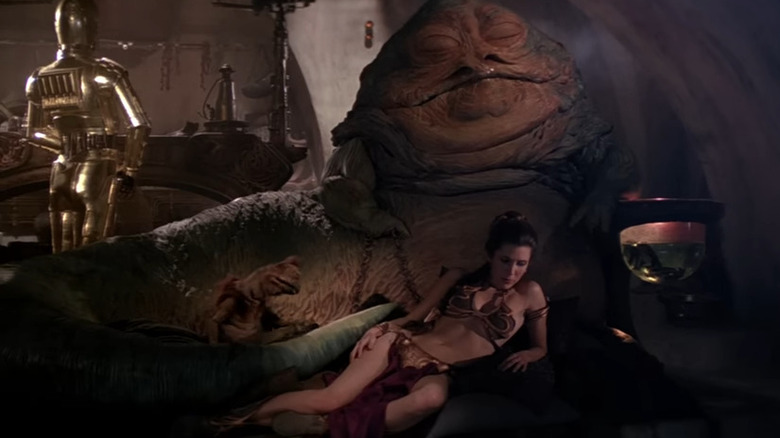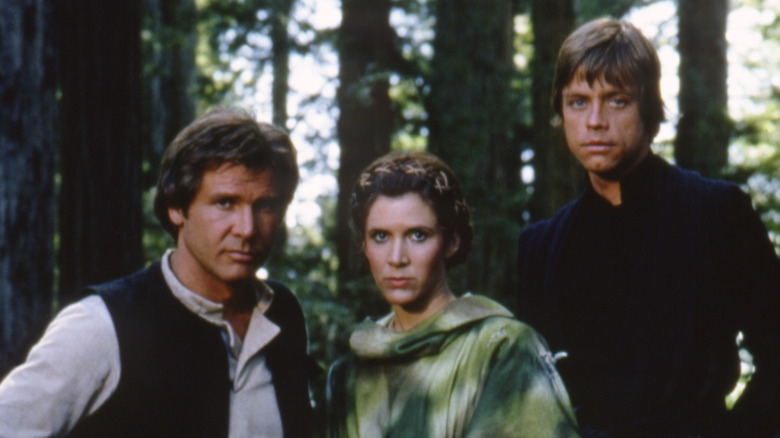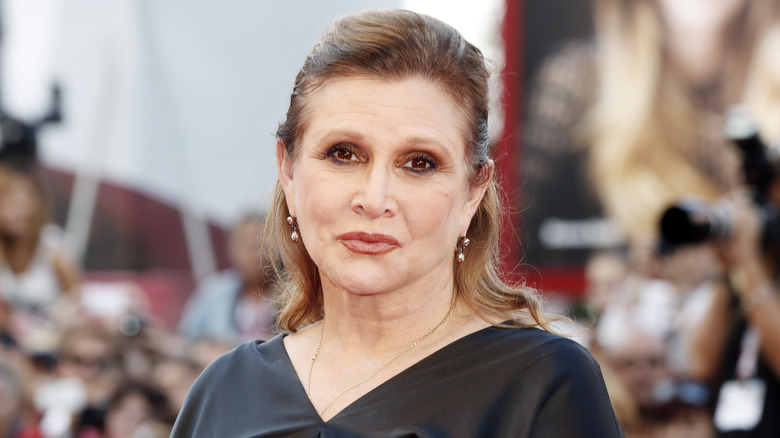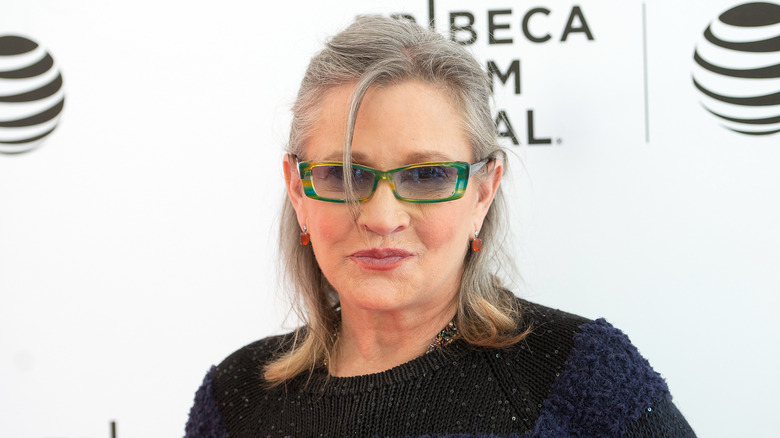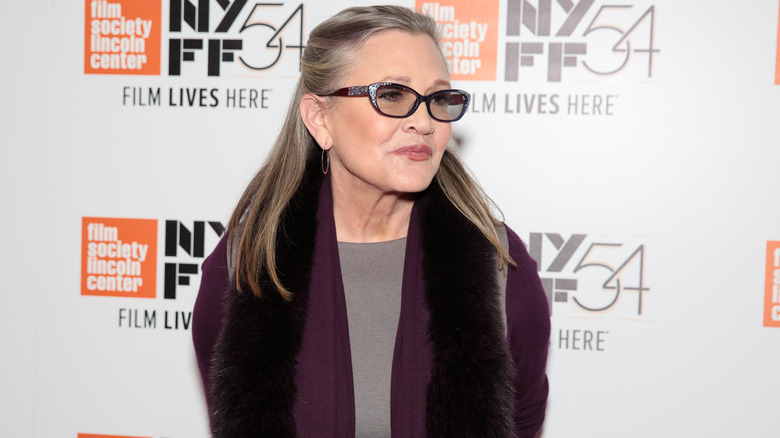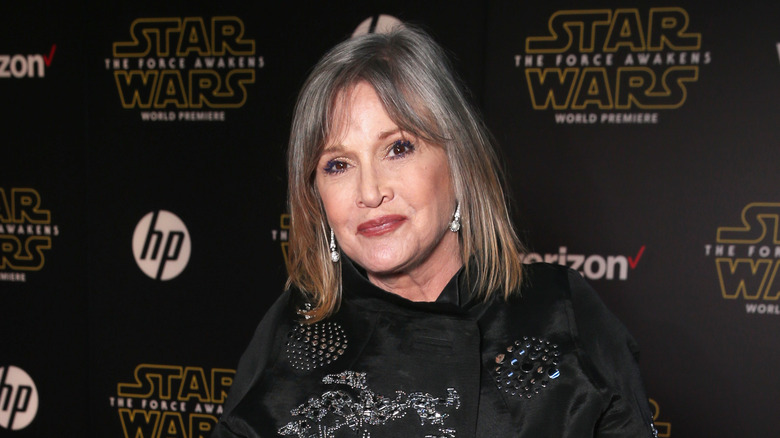Dark Secrets The Late Carrie Fisher Tried To Hide
The following article contains references to mental health issues and addiction.
As the daughter of Debbie Reynolds and Eddie Fisher, Carrie Fisher was already Hollywood royalty when she was born in 1956. Not that she didn't earn that status on her own as well. The late movie star went on to forge an impressive legacy for herself, as every "Star Wars" fan knows well. Fisher never could have known that from the age of 19, she would forever be Princess Leia, but the role defined her career. Even as she moved on from the sci-fi franchise with other roles in cult-classic flicks like "When Harry Met Sally" and turned her hand to writing, producing her debut novel "Postcards from the Edge" in the late '80s, Leia followed. And in the end, Fisher embraced it, reprising her infamous role in 2015.
Fisher tragically died the following year at the age of 60. But before she did, she released two memoirs about her life: "Wishful Drinking" in 2008 and "The Princess Diarist," in October 2016, just two months before her untimely death. In her autobiographies, she revealed a lot of secrets she'd previously kept hidden, and some were darker than others. Her reasoning? "Because I grew up in a public family, I never really had a private life. And so if those issues are going to be public, I would rather them to be public the way I've experienced them rather than someone else assuming things about me," she wrote in "Wishful Drinking" (via HuffPost). Keep reading to find out what dark secrets the late Carrie Fisher tried to hide.
George Lucas' birthday party turned nasty
Carrie Fisher's second autobiography, "The Princess Diarist," detailed her time filming the three original "Star Wars" movies and unearthed shocking secrets from the set. The first dark moment came at George Lucas' 32nd birthday party. It took place on a Friday night at Elstree Studios in Hertfordshire at the beginning of filming in May 1976. Most of the cast and almost every crew member was in attendance.
Although she didn't drink much at the time, Fisher recalled how several members of the crew, including one of the second assistant directors, Terry Madden, plied with alcohol. "I think part of their motive was that I was essentially the only girl at this party and it would be more entertaining to have the only girl at a party completely off her a– drunk than not," she explained. She protested at first but admitted the people pleaser in her gave in, despite knowing it was a stupid choice to make.
When she was several drinks in, things changed. "I don't know when I became aware that quite a few members of a crew were organizing a kind of joke abduction of me ... to get me out of the party and whisk me away to wherever movie crews take young actresses when they want to establish that the actress belongs to them," Fisher revealed. She remembered the situation feeling "dangerous," but someone else at the party noticed what was going on. Her co-star Harrison Ford quickly stepped in, getting into a fight with the crew to free Fisher from their grasp.
Her affair with Harrison Ford
After the fight, Carrie Fisher's night didn't end there. She followed Harrison Ford into his car, and the pair found themselves back at her apartment. One thing led to another, and that was the start of their affair, despite the fact they'd yet to have a substantial conversation together.
Fisher was as shocked as anyone by their relationship because, although she was looking to have a fling with someone on set, she never intended to start up an affair with a married man. "One thing I knew when Harrison and I met was that nothing of a romantic nature would ever happen. It wasn't even an issue," she said in "The Princess Diarist." And, yet it did, and Fisher fell hard. Referring to their romance by their ship name "Carrison" in her book, Fisher explained that they were together for the duration of filming, but that they kept things professional during the week and spent the weekend together. "It was so intense. "It was Han and Leia during the week, and Carrie and Harrison during the weekend," Fisher added in an interview with People.
Although Fisher wrote of their relationship with a wistful romantic tinge, she knew it could never be anything more than it was because Ford was married. In the end, she said: "I forgave him for not loving me in the way one unusually expects, and almost forgave myself for not expecting it."
She regretted not pursuing a relationship with her other co-star
Carrie Fisher shocked the world when she revealed her fling with Harrison Ford 40 years after the fact, but it certainly explained Leia and Han Solo's on-screen chemistry. Fisher also had chemistry with Mark Hamill, who played her on-screen brother Luke Skywalker. And it turns out that there was a romantic connection between Fisher and Hamill as well, but a relationship between them never manifested. After her relationship with Ford ended, Fisher embarked on an eight-year on-and-off relationship with musician Paul Simon.
Nevertheless, that didn't stop her from thinking about the path not taken. Writing about her relationship with Ford in a 1976 diary entry, Fisher admitted: "I'm sorry it's not Mark. It could have been and it should have been. It might have meant something. Maybe not much, but certainly more," per "The Princess Diarist."
It turns out the feeling was mutual, too, but Hamill told The Guardian that his sense of professionalism stopped him from pursuing a relationship with his co-star. "Carrie and I were attracted to one another, but I knew from previous jobs that it would have been a bad idea," he explained. But they did explore their connection once. "I remember one time — I'm sure alcohol was involved — we were talking about kissing techniques. I said: 'Well, I think I'm a fairly good kisser. I like to let the women come to me rather than be aggressive.' And she said: 'What do you mean?' Well, next thing you know, we're making out like teenagers!" Hamill revealed.
Doing cocaine on the set of Empire Strikes Back
When Carrie Fisher started filming "Star Wars" in 1976, she was still a teenager, a few months away from turning 20. But, she was determined to be seen as an adult on set and indulge in "grown-up" experiences, like drinking and having an affair. Although she called her consumption of alcohol the night of George Lucas' birthday "a dark regrettable experience" in "The Princess Diarist," she did drink again ... and quite often.
A lot changed between the filming of "Star Wars" and its 1980 sequel "Empire Strikes Back." In the interim years, Fisher's tolerance for alcohol had increased, and she'd also begun experimenting with drugs, notably cocaine. She may have only been doing drugs recreationally at this point, but it wasn't just on her own time. She was also bringing the substance to set. 30 years later, she revealed to The Guardian: "We did cocaine on the set of Empire, in the ice planet." She added: "I didn't even like coke that much. It was just a case of getting on whatever train I needed to take to get high."
Although she didn't reveal who else made up the "we" in that statement, it was evidently the beginning of her drug addiction. "Slowly I realized I was doing a bit more drugs than other people and losing my choice in the matter," she admitted.
She partied a lot while filming
Cocaine wasn't the only thing Carrie Fisher was doing while filming "Star Wars: Episode V – The Empire Strikes Back." She was partying all night long, too. Back in London to film the sequel at Elstree Studios, Fisher made herself comfortable in the home of "Monty Python" actor Eric Idle. She rented his house for five months. He was away in Tunisia filming the comedy feature "Monty Python's Life of Brian" for some of her time there but returned in time to party with Fisher. Idle introduced her to a drink invented on his movie set called the Tunisian Death Drink, a lethal concoction that she said was given to extras to keep them docile.
Fisher's time at Idle's involved a lot of partying, even when she ought to have been preparing for filming "Empire." One particular night, Idle and a group of popular musicians led to her going to work intoxicated. Fisher revealed to The Daily Beast: "We had an early call, and Eric called down and said, 'The Rolling Stones are here!' and I came down and it was all of them."
However, she wasn't alone in her wild behavior. Her co-star and former lover, Harrison Ford, was right by her side. "I remember that we never went to sleep, so we weren't hungover — we were still drunk when we arrived in Cloud City the next day. We don't really smile a lot in the movie, but there we're smiling," Fisher admitted.
How much she hated Star Wars at times
Over the years, Carrie Fisher expressed her love and gratitude to George Lucas, the "Star Wars" franchise, and Princess Leia on multiple occasions, for all three changed her life. She was proud to be associated with such a strong female character and was happy Leia became a role model for women and girls around the world. However, what she didn't always say so publicly is that there were times when she hated "Star Wars."
Her main gripe with the movies had to do with the wardrobe, as some of her costumes — or the reasons for them — were pretty sexist. In the original movie, now titled "A New Hope," she was forbidden from wearing a bra. The reason George Lucas gave for this? "Because ... there's no underwear in space," she revealed in "Wishful Drinking" (via Vanity Fair).
And, of course, who could forget the infamous gold bikini? Not Fisher, who said she despised the costume. Finally speaking out against it to NPR in 2016, she said, "It wasn't my choice. When [George Lucas] showed me the outfit, I thought he was kidding, and it made me very nervous." Fisher had to move and stand a certain way for aesthetic reasons, and she hated it. The only thing that redeemed the scene for her was taking on the real-life stunt of killing her captor, Jabba the Hutt, and reclaiming her power. "I really relished that," she said.
Fisher was verbally abused by the director of Return of the Jedi
Carrie Fisher, Harrison Ford, and Mark Hamill returned to Elstree Studios in 1982 to film the third and final installment of the original "Star Wars" trilogy. While George Lucas directed the first movie, Irvin Kershner helmed the second, and it was British film director Richard Marquand who was in charge of "Episode VI – Return of the Jedi."
According to Fisher, Marquand brought a completely different tone to set, and she even accused him of being verbally abusive toward her. "I hated him," she admitted to The Daily Beast. "He fell all over Harrison, but he would yell at me constantly," she added. Of course, Fisher felt she couldn't complain about his behavior at the time, and it's not clear whether she ever spoke out against him before this interview. She does recall getting her own back in a small way, though. "He yelled at me one day, and I burst into tears, and it felt great because it f—ed up the makeup. I thought, 'Oh, I f—ed up your shot? Now you see who really f—ed up.' It took an hour for them to do my makeup again."
After the movie wrapped, Marquand went on to direct three more films — "Until September," "Jagged Edge," and "Hearts of Fire" — dramas that were nothing like "Star Wars." He worked on the latter up until his sudden death in 1987 at age 49.
She overdosed at 28
Carrie Fisher struggled with drug addiction for most of her adult life. One of the most turbulent times was in her mid to late 20s, during and after the filming of the third "Star Wars" movie. She'd become accustomed to partying hard but was using drugs to mask other issues and tame her inner demons. "I used to refer to my drug use as 'putting the monster in the box,'" she explained during an interview with Marie Claire. Fisher continued: "I wanted to be less, so I took more — simple as that ... I just wanted to turn the sound down and smooth all of my sharp corners. Block out the dreadfully noisy din of not being good enough — which on occasion I was actually able to do."
But what began as a recreational habit became a problem that was spiraling out of control. Fisher's friend, actor and comedian John Belushi, whom she met on the set of "The Blues Brothers," pointed this out to her, but it took several more years for her to realize the extent of her addiction. In 1984, after ingesting a lethal cocktail of tranquilizers and cocaine, Fisher overdosed and was rushed to the hospital to have her stomach pumped.
Realizing she needed help, Fisher went to rehab and entered into sobriety. Shortly after, she wrote her debut novel "Postcards from the Edge," a semi-fictional tale based on her life, which begins with the overdose.
Carrie Fisher didn't want to accept her bipolar diagnosis
It's likely that when Carrie Fisher said she took drugs to quiet the monster inside her during her 20s, she was actually in the middle of a mental health crisis, struggling with her then-untreated bipolar disorder. Fisher was first diagnosed at age 24, but she didn't accept it nor did she start taking medication for several years. Instead, she was self-medicating to cope with her intense mood swings, taking up to 30 Percodan per day to do so. Looking back on this time years later, she told ABC: "I used to think I was a drug addict, pure and simple — just someone who could not stop taking drugs willfully. And I was that. But it turns out that I am severely manic depressive."
It was only after her overdose that she accepted it and began managing the illness with a combination of medication and electroconvulsive therapy. As she came to terms with her diagnosis, Fisher said it made her realize how strong she was. "At times, being bipolar can be an all-consuming challenge, requiring a lot of stamina and even more courage, so if you're living with this illness and functioning at all, it's something to be proud of, not ashamed of," she wrote in "Wishful Drinking" (via HuffPost).
But Fisher continued to struggle with the effects of bipolar disorder her whole life, and some moments were worse than others. After her daughter Billie Lourd's father, Bryan Lourd, left her for another man for example, Fisher experienced a manic episode.
She suffered from body dysmorphia
Carrie Fisher's mental health struggles also included suffering with body dysmorphic disorder, a disease which was fed by her career in Hollywood. The late actor revealed on "The Late Show with Stephen Colbert" that she was always asked to lose weight for roles. "They wanted to hire part of me, not all of me," she said. Even when she was young, Fisher was ordered to lose 10 pounds before filming "Star Wars" and even more weight before donning the gold bikini in "Return of the Jedi."
With all of this pressure on her, it's perhaps not so surprising that Fisher told The Daily Beast, "I have serious body dysmorphia issues," decades later, in 2015. She expanded on this when she was talking about her appearance in "Star Wars" in "The Princess Diarist." "I had endless issues with my appearance in Star Wars, real ones, not ones you bring up so people think you're humble ... what I saw in the mirror is not apparently what many teenage boys saw," she said.
After decades, Fisher had worked through some of it and became more accepting of her body. She was even able to look back and appreciate her looks as if seeing herself through somebody else's eyes. However, she still felt pressured to lose weight for the 2015 prequel "The Force Awakens." In an attempt to break the cycle, she told star Daisy Ridley not to wear something she wasn't comfortable with.
Her drug addiction continued for years
Carrie Fisher tragically died on December 27, 2016, four days after she suffered a cardiac arrest on a flight from London to Los Angeles. She was rushed to the hospital, where she fell into a coma in the ICU. It was subsequently revealed that Fisher had both heroin and cocaine in her system when she died. According to the toxicology report, she had also come into contact with MDMA.
Confirming her mom's cause of death, Billie Lourd released a statement (via Today) saying: "My mom battled drug addiction and mental illness her entire life. She ultimately died of it." However, she added that she hoped her mom's passing could help others. "She was purposefully open in all of her work about the social stigmas surrounding these diseases. She talked about the shame that torments people and their families confronted by these diseases. I know my mom, she'd want her death to encourage people to be open about their struggles," Lourd said.
If you or anyone you know needs help with mental health issues or addiction, contact the relevant resources below:
- The Substance Abuse and Mental Health Services Administration website or contact SAMHSA's National Helpline at 1-800-662-HELP (4357).
- The Crisis Text Line by texting HOME to 741741, call the National Alliance on Mental Illness helpline at 1-800-950-NAMI (6264), or visit the National Institute of Mental Health website.

